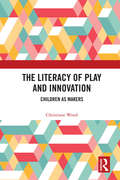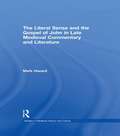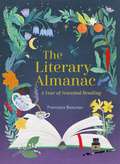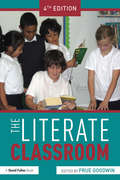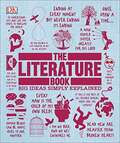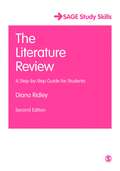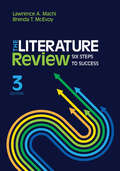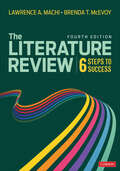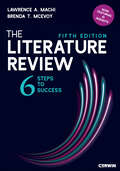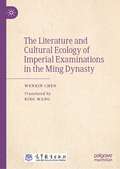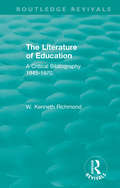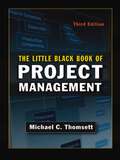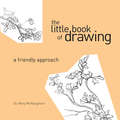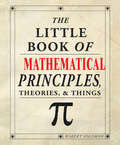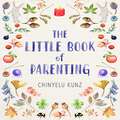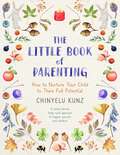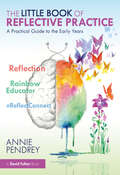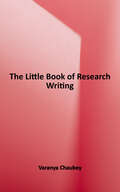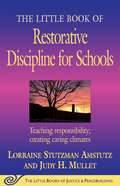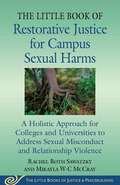- Table View
- List View
The Literacy of Play and Innovation: Children as Makers
by Christiane WoodThe Literacy of Play and Innovation provides a portrait of what innovative education looks like from a literacy perspective. Through an in-depth case study of a "maker" school’s innovative design—in particular, of four early childhood educator’s classrooms—this book demonstrates that children’s inspiration, curiosity, and creativity is a direct result of the school environment. Presenting a unique, data-driven model of literacy, play, and innovation taking the maker movement beyond STEM education, this book helps readers understand literacy learning through making and the creative approaches embedded in early literacy classroom practices.
The Literal Sense and the Gospel of John in Late Medieval Commentary and Literature (Studies in Medieval History and Culture #12)
by MArk HazardFirst Published in 2003. Routledge is an imprint of Taylor & Francis, an informa company.
The Literary Almanac: A year of seasonal reading
by Francesca BeaumanDiscover over 300 seasonal book recommendations in the ultimate reading list for book lovers everywhere.-----'I will be giving this book to everyone I know' - Elizabeth Day'Francesca Beauman writes about the books she loves with irresistible passion, knowledge and warmth ... This is the best kind of reading celebration' - Rachel Joyce-----Spanning the dreary, cold days of January to the first flushes of spring and then the blazing August heat, bibliophile Francesca Beauman offers up a wealth of book recommendations. From The Count of Monte Cristo to Elena Ferrante's Neapolitan Quartet, each has been selected to chime with a particular time of year and provide a richer reading experience. Beautifully illustrated throughout, this charming guide will delight, inspire and seriously extend your 'To Be Read' list!
The Literate Classroom
by Prue GoodwinNow in its fourth edition, The Literate Classroom combines a range of refreshing and challenging viewpoints from experienced classroom practitioners in order to offer practical and effective approaches to teaching reading and writing to primary students. Over the last few years, how teachers talk with children about their learning has been missing from much of the documentation going into school, but with essential information and advice, this book highlights the importance of speaking and listening in literacy learning and recognises the powerful links between reading, writing and dialogic talk. This fully updated edition includes: shared and guided reading and writing comprehension through response to children’s literature guidance on literacy teaching with ELL pupils new chapters on digital literacy, drama for literacy, talk for spelling and poetry. The Literate Classroom describes how the theory behind key areas of literacy teaching can be transformed into realistic learning experiences within the classroom. An accessible and informative collection, this book is a must-have for any teachers of literacy in the primary sector.
The Literature Book: Big Ideas Simply Explained (Big Ideas)
by DkStorytelling is as old as humanity itself. Part of the Big Ideas Simply Explained series, The Literature Book introduces you to ancient classics from the Epic of Gilgamesh written 4,000 years ago, as well as the works of Shakespeare, Voltaire, Tolstoy, and more, and 20th-century masterpieces, including Catch-22, Beloved, and On the Road. The perfect reference for your bookshelf, it answers myriad questions such as what is stream of consciousness, who wrote To Kill a Mockingbird, and what links the poetry of Wordsworth with that of TS Eliot. <p><p> Losing yourself in a great book transports you to another time and place, and The Literature Book sets each title in its social and political context. It helps you appreciate, for example, how Dickens’ Bleak House paints a picture of deprivation in 19th-century England, or how Stalin’s climb to power was the backdrop for George Orwell’s 1984. <p><p> With succinct plot summaries, graphics, and inspiring quotations, this is a must-have reference for literature students and the perfect gift for book-lovers everywhere. <p><p> Series Overview: Big Ideas Simply Explained series uses creative design and innovative graphics along with straightforward and engaging writing to make complex subjects easier to understand. With over 7 million copies worldwide sold to date, these award-winning books provide just the information needed for students, families, or anyone interested in concise, thought-provoking refreshers on a single subject.
The Literature Review
by Diana Ridley'I highly recommend Diana Ridley’s book. One of its great strengths is its relevance to all students in Higher Education required to undertake a literature review. A sense of security prevailed in the presence of the author's uncomplicated writing style and pages rightly divided into manageable chunks. . . [This book] lives up to its claim to contain extensive practical tips on how to prepare, organise and write a successful literature review' - ESCalate Review The Literature Review is a concise step-by-step guide to conducting a literature search and writing up the literature review chapter in Masters dissertations and in Ph. D. and professional doctorate theses. Diana Ridley describes how to carry out a literature review in a systematic, methodical way, providing useful strategies for efficient reading, conducting searches, organising information and writing the review itself. Examples of best and worst practice drawn from real literature reviews are included throughout to demonstrate how the guidance can be put into practice. This is an accessible, pragmatic and highly practical resource that will be welcomed by postgraduate students of any discipline.
The Literature Review: A Step-by-Step Guide for Students (SAGE Study Skills Series)
by Dr Diana RidleyThis second edition of Diana Ridley's bestselling book provides a step-by-step guide to conducting a literature search and literature review, using cases and examples throughout to demonstrate best practice. Ridley outlines practical strategies for conducting a systematic search of the available literature, reading and note taking and writing up your literature review as part of an undergraduate research project, Masters dissertation or PhD thesis. New to this edition are: Examples drawn from a wide range of disciplines A new chapter on conducting systematic reviews Increased guidance on evaluating the quality of online sources and online literature Enhanced guidance in dealing with copyright and permissions issues. Visit the Companion Website for The Literature Review This book also comes with a companion website containing a wide range of examples of successful literature reviews from various academic disciplines. ?SAGE Study Skills are essential study guides for students of all levels. From how to write great essays and succeeding at university, to writing your undergraduate dissertation and doing postgraduate research, SAGE Study Skills help you get the best from your time at university.
The Literature Review: Six Steps to Success
by Dr Lawrence A. Machi Brenda T. McEvoyFrom daunting to doable in six steps The process of literature search and composing a formal literature review can be intimidating. But masters and doctoral candidates in Education and related fields have found academic argumentation to be seamlessly intuitive with the six-step process pioneered by this book. This updated third edition features a wealth of all-new content including: A flowchart that graphically illustrates Machi and McEvoy’s process. Reflective Oversight boxes in each chapter, prompting readers to direct metacognitive activities. Links to online guides and resources. Expanded examples illustrating theoretical concepts.
The Literature Review: Six Steps to Success
by Dr Lawrence A. Machi Brenda T. McEvoyFrom daunting to doable in six steps The process of literature search and composing a formal literature review can be intimidating. But masters and doctoral candidates in Education and related fields have found academic argumentation to be seamlessly intuitive with the six-step process pioneered by this book. This updated third edition features a wealth of all-new content including: A flowchart that graphically illustrates Machi and McEvoy’s process. Reflective Oversight boxes in each chapter, prompting readers to direct metacognitive activities. Links to online guides and resources. Expanded examples illustrating theoretical concepts.
The Literature Review: Six Steps to Success
by Brenda T. McEvoy Lawrence A. MachiThe essential guide—updated, expanded, and easier to use than ever. Creating a successful literature review can be a daunting task, which is why so many researchers have relied on previous editions of this book to make the process more manageable. Using the six-step model, you’ll work seamlessly to narrow your research topic, focus your literature search, negotiate the myriad of books, periodicals, and reports about your topic—and, of course, write the review. Updated, expanded, and reorganized to improve ease of use, the fourth edition of this bestselling handbook includes: New and improved graphics ideal for visualizing the process More explanations and tips, especially for writing in the early stages An expanded range of learning tools Additional reflection sections to direct metacognitive activities Four new reference supplements This pioneering book has provided countless graduate students and researchers with a road map to success. Its model takes you through the logical progression needed for producing a quality literature review—while taking the mystery out of the process.
The Literature Review: Six Steps to Success
by Brenda T. McEvoy Lawrence A. MachiThe essential guide—updated, expanded, and easier to use than ever. Creating a successful literature review can be a daunting task, which is why so many researchers have relied on previous editions of this book to make the process more manageable. Using the six-step model, you’ll work seamlessly to narrow your research topic, focus your literature search, negotiate the myriad of books, periodicals, and reports about your topic—and, of course, write the review. Updated, expanded, and reorganized to improve ease of use, the fourth edition of this bestselling handbook includes: New and improved graphics ideal for visualizing the process More explanations and tips, especially for writing in the early stages An expanded range of learning tools Additional reflection sections to direct metacognitive activities Four new reference supplements This pioneering book has provided countless graduate students and researchers with a road map to success. Its model takes you through the logical progression needed for producing a quality literature review—while taking the mystery out of the process.
The Literature Review: Six Steps to Success
by Brenda T. McEvoy Lawrence A. MachiExpert guidance and cutting-edge tools for every researcher. Complex, time-consuming, and steeped in methodologies, conducting a literature review can often feel overwhelming. A go-to resource for researchers for nearly 20 years, The Literature Review simplifies the process with a structured six-step model to narrow your research topic, focus your literature search, negotiate the myriad of books, periodicals, and reports about your topic—and, of course, write the review. The fifth edition of this bestselling book includes step-by-step guidance on how to use artificial intelligence ethically and effectively across the six steps of the literature review process. Additional features of this thoroughly updated guide include: Practical checklists, templates, and visuals to support your research at every stage. Reflective exercises, learning tips, and questions to ensure a deeper understanding of each process. Recommendations on transparency and responsibility when utilizing AI in academic research. Whether you’re embarking on your first literature review or refining your skills, this book equips you with the tools needed to tackle every stage of the literature review process with clarity and precision.
The Literature Review: Six Steps to Success
by Brenda T. McEvoy Lawrence A. MachiExpert guidance and cutting-edge tools for every researcher. Complex, time-consuming, and steeped in methodologies, conducting a literature review can often feel overwhelming. A go-to resource for researchers for nearly 20 years, The Literature Review simplifies the process with a structured six-step model to narrow your research topic, focus your literature search, negotiate the myriad of books, periodicals, and reports about your topic—and, of course, write the review. The fifth edition of this bestselling book includes step-by-step guidance on how to use artificial intelligence ethically and effectively across the six steps of the literature review process. Additional features of this thoroughly updated guide include: Practical checklists, templates, and visuals to support your research at every stage. Reflective exercises, learning tips, and questions to ensure a deeper understanding of each process. Recommendations on transparency and responsibility when utilizing AI in academic research. Whether you’re embarking on your first literature review or refining your skills, this book equips you with the tools needed to tackle every stage of the literature review process with clarity and precision.
The Literature and Cultural Ecology of Imperial Examinations in the Ming Dynasty
by Wenxin ChenThe book examines the relationship between imperial examinations and literature from the perspective of restoring the cultural ecology of imperial examinations in Ming China, breaking through the paradigm of pure literature research. This book presents an important practice in adjusting the pattern of literary research. The contents of this book include five mutually independent but supportive parts: 1) the living conditions and careers of the literary attendants; 2) the educational background and school’s consciousness of the Ming literati; 3) top candidates and Ming literature; 4) genres of imperial examination and the Ming society; 5) exam cheating cases from the perspective of politics and literature. This book will appeal to readers interested in Chinese literature and culture and the imperial examination system in ancient China.
The Literature of Education: A Critical Bibliography 1945-1970 (Routledge Revivals)
by W. Kenneth RichmondOriginal blurb: "The volume of writing on educational topics has increased so prodigiously in recent years that the student is likely to lose himself in a sea of print. This may lead him to opt for the first book that comes to hand, or waste time rifling through half a dozen when a thorough grasp of one key text is all that is needed. Reading lists commonly look impressive, not to say daunting. In fact, the multifarious titles conceal an enormous amount of duplication, an endless raking over of other people’s research findings. ‘It is a safe bet’, writes W. Kenneth Richmond, ‘that less than 5 percent of the contents of any new book on education will be in any way original’." This critical bibliography, originally published in 1972, is concerned with the noteworthy books and major official reports that had appeared in the English language during the twenty-five years prior to publication. In his introduction and in the commentaries prefacing each section the author explains the background to the genuinely new departures of the period and describes successive changes in the climate of educational opinion.
The Little Black Book of Project Management (The\little Black Book Ser.)
by Michael ThomsettThe revised and updated third edition of this book reflects the newest techniques, the latest project management software, as well as the most recent changes to the Project Management Body of Knowledge (PMBOK™).For nearly twenty years, The Little Black Book of Project Management has provided businesspeople everywhere with a quick and effective introduction to project management tools and methodology. You will find invaluable strategies for:organizing any project; implementing the Six Sigma approach; choosing the project team; preparing a budget and sticking to it; scheduling, flowcharting, and controlling a project; preparing project documentation; managing communications; and much more. Project management has increasingly become about getting more and better results with fewer resources. In this fast-read solution for both seasoned and first-time project managers, author Michael C. Thomsett shares his not-so-little secrets to achieving the results professionals want, increasing their organizational ability, generating consistent profit, and gaining a reputation for both quality and dependability.
The Little Book of Drawing: A Friendly Approach
by Mary McnaughtonThe drawing book for everyone.What happened? As kids, we were all artists. After all, it doesn't take much: a pencil, some paper, a few minutes at a time and the basic concepts illustrated in The Little Book of Drawing. This book is the friendly little reminder that anyone can draw and draw well. Dr. Mary McNaughton's unique, friendly approach will help you rediscover art and develop that creative voice within you.Covers all the fundamental concepts and techniques—stuff like contour and gesture drawing, the importance of value, how to build strong compositions and finding good subjects.Provides engaging exercises challenge you to take your art to the next level by drawing with your other hand, working in series, turning your name into art, and other friendly exercises.Helps you apply what you've learned and explore your own unique style in a series of drawing projects that range from gardens and landscapes to animals and the human figure.The Little Book of Drawing gives you enough direction to get you going, yet not so much that you feel overwhelmed or frustrated. The steps are little, but the results are big.
The Little Book of Mathematical Principles, Theories & Things
by Robert SolomonThis little book makes serious math simple—with more than 120 laws, theorems, paradoxes, and more explained in jargon-free terms.The Little Book of Mathematical Principles provides simple, clear explanations for the principles, equations, paradoxes, laws, and theorems that form the basis of modern mathematics. It is a refreshingly engaging tour of Fibonacci numbers, Euclid's Elements, and Zeno's paradoxes, as well as other fundamental principles such as chaos theory, game theory, and the game of life.Renowned mathematics author Dr. Robert Solomon simplifies the ancient discipline of mathematics and provides fascinating answers to intriguing questions, such as: What is the greatest pyramid?, What is a perfect number?, and Is there a theory for stacking oranges?
The Little Book of Parenting: How to Nurture Your Child to Their Full Potential
by Chinyelu KunzChinyelu Kunz is a childhood educational mentor and a leading parenting coach. Her expertise has supported thousands of families in their mission to nurture and encourage content, kind and thriving children, who continue to blossom into adulthood - and she distils it here into a must-buy book for parents seeking to raise emotionally healthy children. The Little Book of Parenting covers everything you need to raise happy, resilient children from preschool to adult. Focusing on your emotional wellbeing as a starting point, it enables you to support your child with a healthy foundation, the ability to self-regulate, your dynamics as a family and the importance of clear but lovingly-set boundaries and solid routines. Implementing the practical and emotional advice in this book will help parents unlock their child's unique potential so they can thrive, grow into their best and unique self, and emerge into adulthood with a rock-solid foundation as a confident, happy and content being. There are special tips and advice and a plethora of actionable bite-sized takeaways which make the reader's experience relaxing, digestible and relatable.
The Little Book of Parenting: How to Nurture Your Child to Their Full Potential
by Chinyelu KunzChinyelu Kunz is a childhood educational mentor and a leading parenting coach. Her expertise has supported thousands of families in their mission to nurture and encourage content, kind and thriving children, who continue to blossom into adulthood - and she distils it here into a must-buy book for parents seeking to raise emotionally healthy children. The Little Book of Parenting covers everything you need to raise happy, resilient children from preschool to adult. Focusing on your emotional wellbeing as a starting point, it enables you to support your child with a healthy foundation, the ability to self-regulate, your dynamics as a family and the importance of clear but lovingly-set boundaries and solid routines. Implementing the practical and emotional advice in this book will help parents unlock their child's unique potential so they can thrive, grow into their best and unique self, and emerge into adulthood with a rock-solid foundation as a confident, happy and content being. There are special tips and advice and a plethora of actionable bite-sized takeaways which make the reader's experience relaxing, digestible and relatable.
The Little Book of Parenting: How to Nurture Your Child to Their Full Potential
by Chinyelu KunzChinyelu Kunz is a childhood educational mentor and a leading parenting coach. Her expertise has supported thousands of families in their mission to nurture and encourage content, kind and thriving children, who continue to blossom into adulthood - and she distils it here into a must-buy book for parents seeking to raise emotionally healthy children. The Little Book of Parenting covers everything you need to raise happy, resilient children from preschool to adult. Focusing on your emotional wellbeing as a starting point, it enables you to support your child with a healthy foundation, the ability to self-regulate, your dynamics as a family and the importance of clear but lovingly-set boundaries and solid routines. Implementing the practical and emotional advice in this book will help parents unlock their child's unique potential so they can thrive, grow into their best and unique self, and emerge into adulthood with a rock-solid foundation as a confident, happy and content being. There are special tips and advice and a plethora of actionable bite-sized takeaways which make the reader's experience relaxing, digestible and relatable.
The Little Book of Reflective Practice: A Practical Guide to the Early Years
by Annie PendreyThe Little Book of Reflective Practice is bursting with big ideas which will encourage you to be curious, reflective and courageous in your professional learning journey. It introduces the key reflective theories alongside case studies from educators to show how these can be applied to improve practice. The journey from being to thriving is set out in several chapters each providing different themes which will encourage you to capture your reflections, record your learning and development and apply theories of reflection to your professional practice. Full of practical guidance, activities and questions to prompt reflective thinking, the chapters cover: getting started how to write reflectively creating spaces to be reflective using reflective practice to set targets for your learning and professional development Spaces for capturing your reflective thoughts and reflective activities are provided througout, alongside sections where you may wish to stop and engage in deeper thinking. This book will be invaluable reading for early years practitioners, tutors and early years students on level 3 courses and Foundation Degrees.
The Little Book of Research Writing
by Varanya ChaubeyThis book is about the first challenge of research writing: structuring many, complex details into a coherent whole. It offers a method for building a structurally sound research paper from scratch. The book is primarily intended for PhD candidates and postdocs but could also serve researchers on the tenure track. Most examples in the book come from research papers in economics. The method has been taught at various PhD programs, including Berkeley, Columbia, Harvard, MIT, Princeton, Oxford etc.
The Little Book of Restorative Discipline for Schools: Teaching Responsibility; Creating Caring Climates (Justice and Peacebuilding)
by Lorraine Stutzman AmstutzCan community-building begin in a classroom? The authors of this book believe that by applying restorative justice at school, we can build a healthier and more just society. With practical applications and models.Can an overworked teacher possibly turn an unruly incident with students into an "opportunity for learning, growth, and community-building"? If restorative justice has been able to salvage lives within the world of criminal behavior, why shouldn't its principles be applied in school classrooms and cafeterias? And if our children learn restorative practices early and daily, won't we be building a healthier, more just society?Two educators answer yes, yes, and yes in this new addition to The Little Books of Justice and Peacebuilding series. Amstutz and Mullet offer applications and models. "Discipline that restores is a process to make things as right as possible." This Little Book shows how to get there.
The Little Book of Restorative Justice for Campus Sexual Harms: A Holistic Approach for Colleges and Universities to Address Sexual Misconduct and Relationship Violence (Justice and Peacebuilding)
by Rachel Roth Sawatzky Mikayla W-C McCrayA restorative justice approach to addressing sexual misconduct in colleges and universities. Written for college and university practitioners and administrators, The Little Book of Restorative Justice for Campus Sexual Harms: A Holistic Approach to Address Sexual Misconduct and Relationship Violence for Colleges and Universities combines explanation, justification, and contextualization for the application of restorative justice (RJ) for sexual misconduct, including for alleged Title IX violations. This book outlines considerations, action steps, and best practices for campuses that are interested in exploring the successful implementation of RJ for sexual misconduct. The authors' backgrounds as practitioners within the higher education context grounds this work with personal reflections, experiences, and stories. This book provides a primer for colleges and universities who seek to move campus culture in a more restorative direction generally, and specifically for practitioners interested in exploring the possibility of amending existing sexual misconduct policies, including investigative-adjudicatory Title IX policy and procedures, through a restorative justice informed lens. Readers will explore why it makes all the difference (for both students and administrators) to add RJ resolution options.
